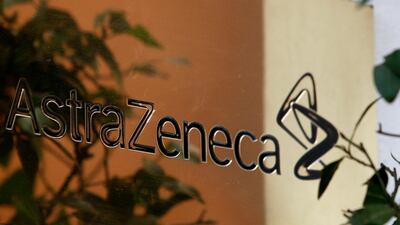Britain’s AstraZeneca agreed to buy US drug maker Alexion Pharmaceuticals for $39 billion in its largest deal to bolster its position in immunology and rare diseases.
The deal comes in a week that AstraZeneca said it was conducting further research to confirm whether its Covid-19 vaccine could be 90 per cent effective, potentially slowing its distribution, and as a rival shot from Pfizer was launched in Britain and approved for use in the US.
Alexion shareholders would receive $60 in cash and about $115 worth of equity per share – either in AstraZeneca’s UK-traded ordinary shares or in dollar-denominated American Depositary Shares, the company said on Saturday.
Based on a reference average American depositary receipt price of $54.14, that implies a total price of $175 per share. Alexion shares closed at about $121 on Friday.
“It is a tremendous opportunity for us to accelerate our development in immunology, getting into a new segment of disease, a new segment of physicians and patients we haven’t been able to cover so far,” said AstraZeneca chief executive Pascal Soriot.
The British company said the boards of both companies had approved the deal which, subject to regulatory and shareholder approval, is expected to be completed in the third quarter of next year.
AstraZeneca was once seen as leading the race to develop a Covid-19 vaccine, but it fell behind Pfizer and its partner BioNTech, as well as Moderna, whose vaccines have shown greater efficacy in late-stage clinical trials.
Alexion generates billions in cash from its rare disease treatments and sells one of the costliest drugs in the world – rare blood disease medicine Soliris – which can cost hundreds of thousands of dollars per patient.
However, its shares have struggled in recent years as investors have worried whether it would be able to sustain revenue if competition heats up – a stock market performance that has made it seen as a possible bid target.
Hedge fund Elliott Management, one of the world’s most powerful activist investors, had for months been urging Alexion to seek a buyer and in May spoke out publicly one day before the company’s annual shareholder meeting.
The fund, which had held private meetings with the company, said chief executive Ludwig Hantson’s “go-it-alone” approach had failed to yield the desired results and that its plan to buy rivals to diversify its research pipeline were heading in the wrong direction.
Elliott Management first invested in Alexion in 2017, when the share price was only slightly lower than Friday’s close of $120.98. The hedge fund did not immediately respond to a request for comment.
AstraZeneca said it expected the deal to immediately boost core profits and to deliver pretax synergy gains of about $500 million per year. It also expects about $650m in one-time cash costs during the three years after the deal is completed.
Mr Soriot said the deal was the result of exclusive talks and no competitive bidder was involved.
AstraZeneca finance chief Marc Dunoyer said a capital increase for the equity component of the transaction would take place on closure of the deal.
On AstraZeneca’s Covid-19 vaccine, Mr Soriot said it was yet to be clear if the company would need results from a US clinical trial before filing for approval with US regulators.
Assuming positive results from that trial, the company should be able to submit the vaccine to US regulators within the next six weeks, he said.

